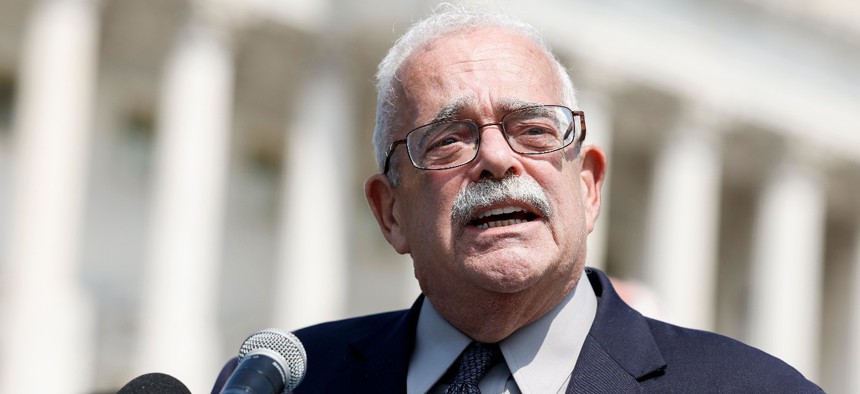
Rep. Gerry Connolly, D-Va., introduced the language that would prevent the creation of new schedules such as the proposed Schedule F. Anna Moneymaker/Getty Images
A Schedule F Ban Is Among Many Workforce Provisions in the Annual Defense Policy Bill the House Just Passed
Lawmakers also added language to grant full civil service protections and a pay raise to TSA employees to the must-pass bill before its approval Thursday.
The House on Thursday voted 329-101 to pass the fiscal 2023 National Defense Authorization Act, which calls for nearly $1 trillion in defense spending and makes a number of big changes to federal personnel policies across government.
The NDAA’s status as an annual must-pass bill means that it often serves as a vehicle for provisions that affect all of the federal government. The federal government’s current policy to provide federal workers with up to 12 weeks of paid parental leave each year was enacted as part of the fiscal 2020 National Defense Authorization Act.
Prior to consideration of this year's bill on the House floor this week, the House Armed Services Committee had already added language codifying President Biden’s executive order establishing a $15 per hour minimum wage for federal contractors, instructing federal agencies to provide at least $1,000 in recruitment and retention bonuses for federal wildland firefighters, and protecting inspectors general from political retaliation.
Over the course of two days of debate and consideration of more than 600 amendments, the list of workforce policy changes in the legislation continued to grow. Atop the heap were two amendments inserting the text of bills that have been important for House Democratic lawmakers but thus far have seen no action in the Senate.
First was legislation from Rep. Bennie Thompson, D-Miss., that would apply Title 5 of the U.S. Code to the Transportation Security Administration workforce, bringing them onto the General Schedule pay scale and granting them access to the rest of the federal government’s whistleblower and due process protections, as well as full federal sector collective bargaining rights. If enacted, that means TSA screeners would see an average pay increase of 30%, while air marshals would see a 21% raise.
Another Democratic priority that made it into the final House version of the bill is Rep. Gerry Connolly’s Preventing a Patronage System Act. That legislation is aimed at preventing future administrations from unilaterally reviving efforts to reclassify federal jobs outside of the federal government’s competitive service, like the Trump administration’s unsuccessful effort to create a new Schedule F for employees in policy-related positions, which threatened to strip thousands of federal workers of their civil service protections.
The bill prevents any president from unilaterally creating a new schedule within the excepted service, effectively forcing the executive branch to request that Congress make any additions via legislation.
Lawmakers also added to the Defense policy bill before its passage the text of the Federal Firefighters Fairness Act, another bill already passed by the House that would reform the federal government’s workers compensation program by creating a presumption that if federal firefighters develop one of a number of serious health conditions, they contracted those diseases due to on-the-job exposure. This would make it much easier for them to apply for and qualify for disability benefits.
And Rep. Jackie Speier, D-Calif., successfully amended the legislation to require the Office of Personnel Management to create a supplement to the annual Federal Employee Viewpoint Survey to solicit questions about federal workers’ experiences with harassment and discrimination in the workplace.
Federal employee groups were quick to support many of the amendments’ inclusion in the House’s final version of the bill.
“This bill contains many of our legislative priorities, including more competitive pay and job protections for the hard-working civil servants who keep our federal government running,” said Everett Kelley, national president of the American Federation of Government Employees. “We applaud the House for passing this legislation in a bipartisan fashion, and we look forward to working with the Senate and the conference committee to further improve this legislation.”
Ken Thomas, national president of the National Active and Retired Federal Employees Association, sent a letter to lawmakers urging support for Connolly’s anti-Schedule F amendment.
“Given the attempt in late 2020 to create a broad new excepted service category with rules more akin to those covering political appointments, and recent legislative efforts to revive that idea, it is critical to pass this amendment now,” he wrote. “It would provide a real, bipartisan check preventing our nation from returning to the spoils system of the late 1800s and ensuring we remain a nation governed by laws.”
One amendment that has caused some discord between House Democrats and the White House, introduced by Rep. Jamaal Bowman, D-N.Y., would allow the Defense secretary to grant a 2.4% salary increase through “inflation bonus pay” in 2023 for servicemembers and civilian Defense Department employees, in addition to their normal annual pay raise. The normal pay raise is currently slated to be an average 4.6% increase unless Congress overrides President Biden before the end of this year.
Although this provision was approved by voice vote with dozens of other amendments, the White House has warned it is opposed to the extra pay.
“The administration strongly opposes the limited inflation bonus that would apply only to Department of Defense civilian employees for calendar year 2023,” the administration wrote on Tuesday. “This provision would create significant pay inequities among federal civilian employees and creates other problems, including for the calendar year 2024 pay adjustment, as currently drafted. The administration urges the Congress to support the robust governmentwide civilian pay increase of 4.6% included in the fiscal 2023 budget request.”
The bill now heads to the Senate for consideration.







